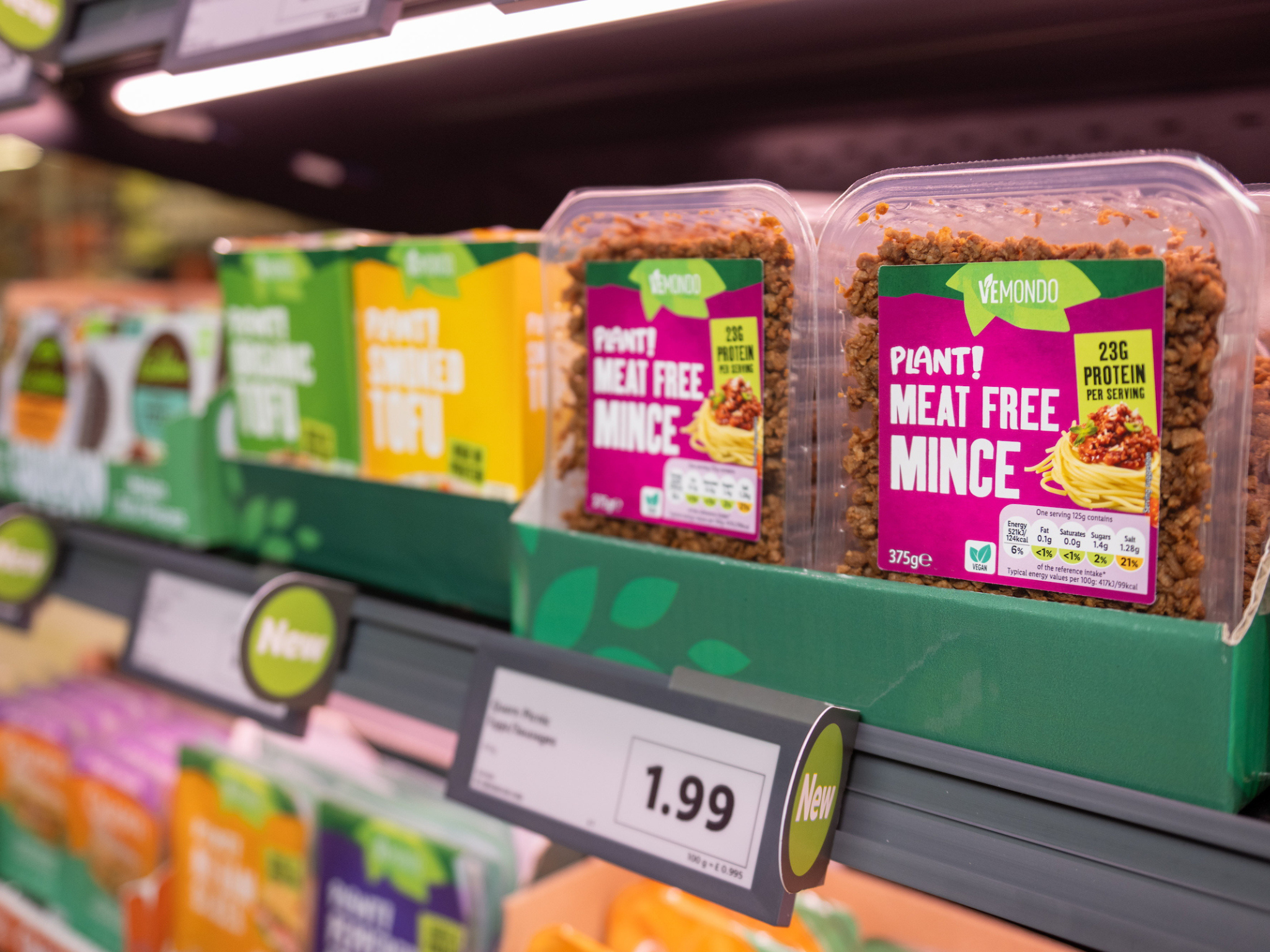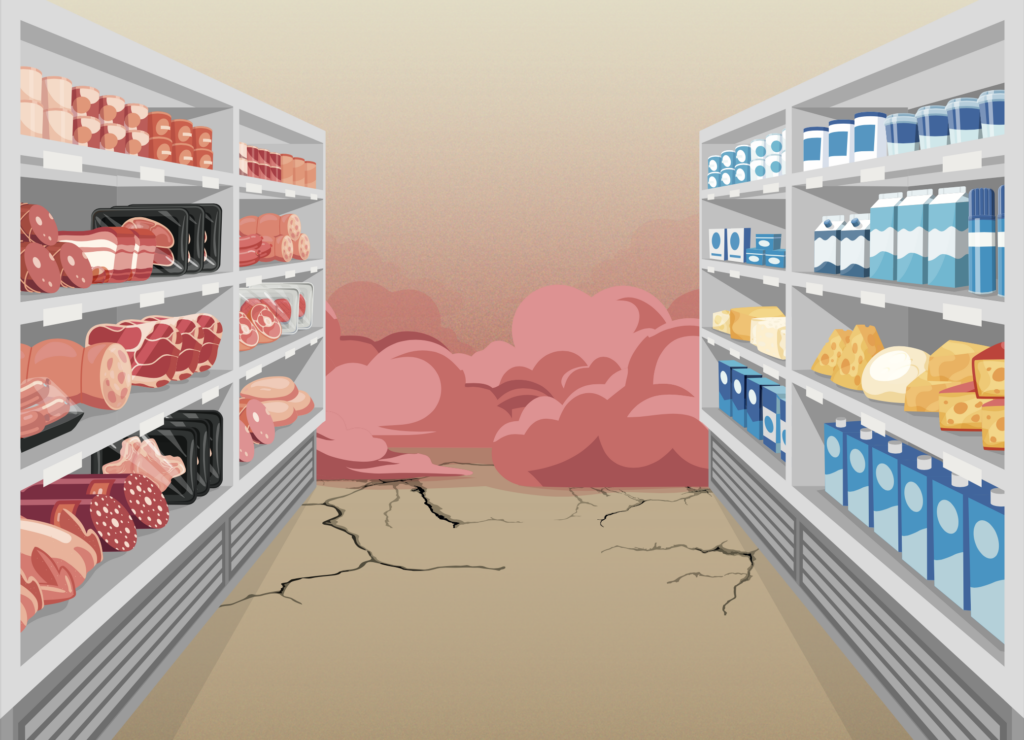
The UK government’s initiative to make reporting of healthy food sales in supermarkets mandatory doesn’t go far enough, experts say in a new report.
British supermarkets must disclose the ratio of plant- and animal-based proteins sold, their fruit and vegetable sales, and their climate emissions alongside the healthy food sales mandated by the government, according to more than 200 organisations.
In a report coordinated by the Eating Better alliance, the climate, animal rights, farming, and health groups say the UK’s healthy eating push is lacking.
At the end of June, the government partnered with supermarkets to tackle obesity and encourage healthy eating. As part of this initiative, retailers will mandatorily disclose healthy food sales, a move that Henry Dimbleby – author of the National Food Strategy – said “creates a level playing field, rewards the businesses already acting, and gives us a clear picture of what’s really being sold”.
Eating Better and its co-signatories are asking the government to ensure this reporting goes beyond just healthy food sales and incorporates sustainability and other health criteria too.
“While mandatory reporting on healthy food sales is a critical first step, it must rapidly evolve to include key socioecological criteria to drive the much-needed transformational changes and innovations across supply chains,” said Catherine Chong, ESG advisor and engagement lead at Clear, a consortium of over 40 organisations.
“A vegetable farmed and processed with synthetic agrochemicals may have the same calorie profile as one grown under agroecological principles, but would have vastly different impacts on climate change, biosphere integrity, biogeochemical flows, land-system, freshwater, and chemical pollution – planetary boundaries that have direct implications on food security and public health,” she added.

Why climate must be included in mandatory reporting standards
The organisations have outlined the minimum expectations around the measurement of different sales metrics, each of which should be based on volume sales.
In terms of healthy food, large food businesses should report sales weighted by the Nutrient Profiling Model score, as well as by the percentage of foods not high in fat, sugar, and salt content.
“These metrics should be seen as a minimum, with the wider sector including small and medium businesses developing data systems to look at macronutrients (assess fibre, calories, sugar and salt, and saturated fat sales too) to get a real indication of health impacts,” the report stated.
In addition, the authors call for the mandatory reporting of the ‘protein split’; i.e., how many protein sales come from plant-based and animal sources. This is because overconsumption of meat, dairy, seafood and eggs is linked with the “highest diet-related environmental impacts”.
Many retailers across Europe are already doing so, setting targets to increase the share of protein sales from plant-based foods. Discount supermarket Lidl is a leader on this front. Last year, it pledged to have 25% of its meat and seafood sales in the UK come from plants by 2030, and double the share of non-dairy milk sales (from 6.4% in 2021).

“While vegetables are excluded from protein food type disclosure, products that are intended as direct replacements for livestock-based protein food products should still be included,” the organisations said. “When retailer reporting processes and systems are able to measure to composite ingredient level, blended products that include vegetables and less meat can also be included.”
Moreover, mandatory reporting must include all types of fruits and vegetables sold, as they are the “cornerstone of healthy and sustainable diets”. Additionally, food businesses are being urged to report their climate emissions and mitigation progress across Scopes 1, 2 and 3.
“Emissions from the food and farming system are often considered too hard or politically sensitive to tackle, but by mandating clear emissions source reporting for food companies, it sets a baseline from which concrete steps can be taken,” the report explained.
Protein split can help the 10-year NHS plan
The organisations argued that including these sales metrics in mandatory reporting will provide the foundation of the government’s 10-year plan for the National Health Service (NHS), which is what its partnership with supermarkets stems from.
“The government has a fantastic opportunity to build on work already done within the food and drink industry to make reporting of key human health, environmental sustainability and animal welfare metrics mandatory, transparent and meaningful,” the report said.
“Other important food system metrics around sustainable farming, including animal welfare (and other method of production’s metrics), sustainable fishing, deforestation, food waste, nutrient density, additives and processing methods should have mandatory food business reporting as soon as feasible,” it added.
“We know there is the appetite for people to eat in a way that is better for their own health and for the health of the planet, but there are so many barriers preventing them from doing this,” said Sophie Tebbetts, CEO of surplus food and community meals charity FoodCycle. “By collectively coming together we have the ability to empower and support people to make more sustainable food choices and create long-term behavioural change.”

While the 10-year NHS plan was welcomed by groups like The Vegan Society, it was criticised for neglecting the benefits of plant-based foods, and diet and nutrition as a whole. Research has shown that a ‘plant-based by default’ approach could save the NHS £74M annually, cut its carbon footprint by up to 50%, and reduce the prevalence of several major diseases.
Over 1,200 health experts have called on the NHS to adopt a ‘plant-based by default’ approach. And polling has found that the NHS chooses to adopt fully vegan menus at its hospitals, 35% of Brits would back the move.
“It’s vital that our government joins the dots on the health, sustainability and animal protection benefits of plant-based foods – and, unfortunately, it has not done this with its NHS 10-year plan,” said Emily Angus, senior dietitian at The Vegan Society.
“The government can still put that right with its forthcoming food strategy, where plant-based foods can help meet all its stated goals, including healthier food, UK food security, environmental protection and economic growth.”
The post ‘Plant Protein Split’ Must Be Part of Mandatory Reporting on UK Food Sales, Say 200+ Organisations appeared first on Green Queen.
This post was originally published on Green Queen.